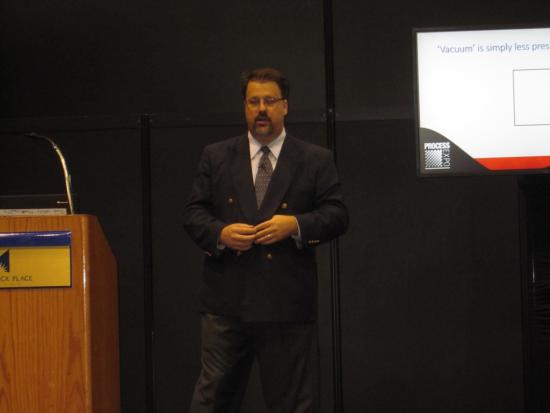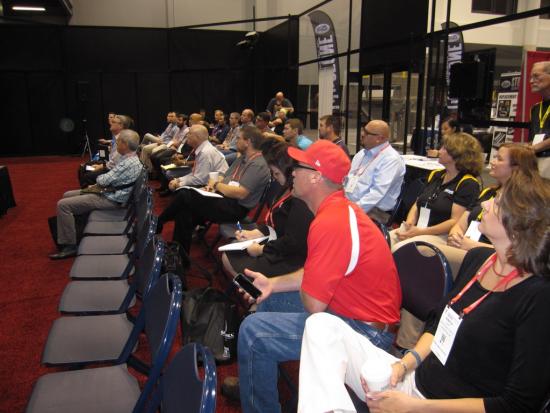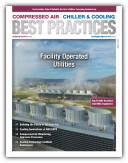The 2017 edition of Process Expo was held in October at McCormick Place in Chicago. Produced by the Food Processing Suppliers Association (FPSA). The American Meat Association (NAMA) also co-located their fall conference at Process Expo 2017. Our publications are honored to work together with Process Expo and have our magazines present in the literature bins as well as contribute to the conference portion of the event.
The FPSA announced over 500 exhibitors covering more than 220,000 square feet of exhibit space. Attendance was announced at nearly 14,000 visitors “We would like to thank our exhibitors, attendees, sponsors, partners and all of the FPSA committees for their hard work and dedication in making this year’s Process Expo an important gathering for the food and beverage processing industry,” said Tom Kittle, Chairman, FPSA.
Process Expo delivered an exciting and informative four-day event at the McCormick Place Convention Center attracting a qualified group of attendees who took advantage of the various educational tracks including food safety, hygienic design and FSMA regulations. Attendees were also able to see three full working production lines right on the show floor, and even explore state-of-the-art technology in the Virtual Reality Showroom.
There was also plenty to celebrate at Process Expo this year. Cakes and awards were presented to SPX Flow, Inc., and G.J. Olney, Inc. for their 100th anniversary of membership with the FPSA. Process Expo also welcomed IFFA/Messe Frankfurt officials with a Beer Garden reception complete with oompah music. The FPSA’s newest initiative, the FPSA Women’s Council, held a leadership breakfast with a keynote presentation from Jane Grote Abell, board chair and member of the founding family of Donatos Pizza.
The Food Processing Suppliers Association (FPSA) is a global trade association serving suppliers in the food and beverage industries. The Association's programs and services support member's success by providing assistance in marketing their products and services, overall improvement in key business practices and many opportunities to network among industry colleagues. Programs and services to achieve these objectives include Process Expo (industry leading trade show), electronic media marketing, education, market intelligence, research, and advocation of critical industry issues such as food safety, sanitary design of equipment, and global trade. FPSA members are organized in vertical industry councils which focus on specific needs and concerns that are unique to each industry sector. FPSA councils currently represent the Bakery, Beverage, Dairy, Prepared Foods and Meat sectors.
The exhibition portion had at least 500 companies exhibiting and during the hours allocated, I did my best to visit as many compressed air, vacuum and cooling system booths as possible. All three plant utilities, of course, play critical roles in the production and packaging of food and beverage products.
Vacuum Pump Systems
Primary meat packaging is an important part of Process Expo and a big application for vacuum pumps. Applications include vacuum chamber machines, form-fill-seal machines and modified atmosphere packaging (MAP).
Over 2.5 million Busch R 5 oil-lubricated rotary vane vacuum pumps are in operation worldwide - and primary meat packaging may be the largest market segment. The technology is widely known for reliability and energy efficiency - whether in a 24/7 application or being used intermittently. A market leader in primary packaging, the robust design includes recirculation oil lubrication and a ultimate pressure range from 0.075 to 15 Torr (2.8 to 1,030 acfm) at 60 Hz pumping speed. Units may be fitted with an optional gas ballast valve so vapors can be pumped without condensing. At the Busch booth, Gary Lane and Troy Bridges were talking about the latest R 5 models; the R 5 RA 0040F has a pressure range to 0.075 Torr and 28 acfm. The R 5 RA 0630B has a pressure range of .5 Torr and 455 acfm.

Gary Lane and Troy Bridges next to the R5 RA 0040 vacuum pump model capable of .075 Torr and 28 acfm (left to right).
Leybold’s U.S. subsidiary is based in my hometown of Pittsburgh so I’m always pleased to see them. James Hupp and Pierre Lantheaume said the Company is encouraging clients to consider the benefits of dry technology and experiencing good results. “Leybold offers a broad range of dry claw and dry screw pumps to customers who like the idea of an oil-free technology.” They commented applications like freeze-drying are adopting dry vacuum pump technology.
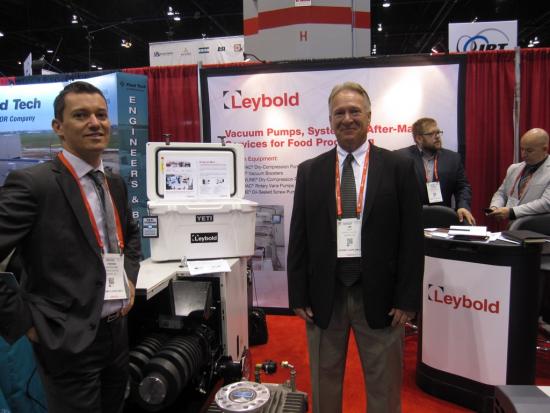
Pierre Lantheaume and James Hupp presented dry claw and dry screw vacuum pumps at the Leybold booth (left to right).
Becker is a leading manufacturer of vacuum pumps and at Process Expo the team was focusing on their U 5 Series designed for primary packaging. This oil-lubricated line of rotary vane vacuum pumps has four models with an ultimate pressure capability of 0.1 mbar absolute (0.075 Torr) and 60 Hz. Nominal air flow range of 49.4 to 141.3 cfm. The units come with an adjustable standard gas ballast providing a water vapor tolerance of 7 mbar at 85 °C operating temperature. An optional gas ballast is available for <3 mbar. At the Becker booth, Sales Manager Darin Ladd said, “A significant feature is the faster (vs. the competition) pump down time for the evacuation of chambers of <100 liters. This helps our clients run their product lines at faster speeds.” Becker also says the new U 5 line has optimized motor power, reducing the kW energy consumption of the units.
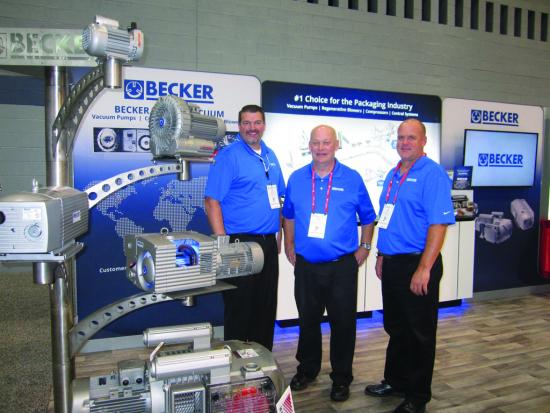
Josh Lancaster, Darin Ladd and Jim Duggan at the Becker booth (left to right).
Compressed Air Systems
Compressed air comes into direct and indirect contact with food products. In order to ensure product safety standards are met, having a well-designed system with a well understood specification for compressed air quality is very important. At Compressed Air Best Practices® Magazine, we believe food industry plants should consistently verify whether or not they are meeting the compressed air specification they established. We also believe the percentage of food industry factories actually doing this is not what it should be - even though the compressed air industry offers all the technologies to do it.
|
|
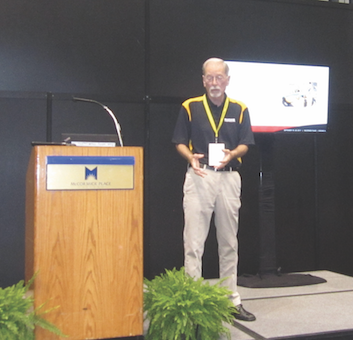 |
Our publications organized a ProcessU session titled, “Vacuum and Compressed Air Best Practices.” Speakers were Troy Bridges from Busch Vacuum Pumps and Systems and Wayne Perry from Kaeser Compressors (left to right). |
|
|
|
|
Our publications organized a ProcessU session titled, “Vacuum and Compressed Air Best Practices.” |
|
Kaeser Compressors was exhibiting, as is their usual focus, complete compressed air systems. For the longest time, Kaeser has educated end users to understand the whole system from intake air quality (make sure it’s not near the loading dock and full of hydrocarbons), to their rotary screw air compressors (lubricated AND oil-free), to the air purification equipment and condensate management products and finally to the piping system. Their aluminum SmartPipe™ system always gets a lot of attention! The Kaeser Chicago team, led by Rod Miotti, said booth traffic was very solid. Technical Director Wayne Perry was as usual counseling folks on complete compressed air system designs-helping them ask the right questions with regards to their own unique systems.
- What is our compressed air demand profile, do we have the right air compressors, controls and piping/storage systems installed to reliably match demand at the lowest total lifecycle cost?
- Based upon the existing piping system and applications, should air purification products be centralized or decentralized?
- What pressure dewpoint specification do we need, should we have more than one specification? What dryers are required?
- What levels of liquid oil, oil vapor and particulate filtration do we need?
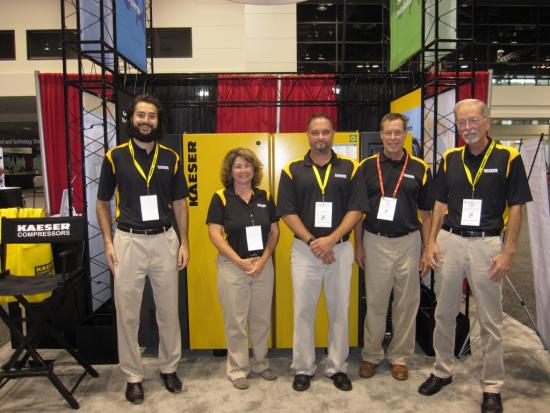
Michael Stephanski, Tracy Carter, Rod Miotti, Rob Baumann and Wayne Perry at the Kaeser Compressors booth (left to right).
Chillers and Cooling Systems
Thermal Care is a Niles, Illinois based process cooling system manufacturer with a broad range of cooling equipment. I haven’t spent a lot of time with them, but they have caught my attention from afar because they appear to have a uniquely comprehensive ability to address the entire cooling system for a customer. The Thermal Care product line includes evaporative cooling towers, adiabatic fluid coolers and custom tank systems (including pump reservoirs). The company has been on a strong growth trajectory and presents itself as a true systems company. We like companies aware of and able to help plants with the whole system! At Process Expo, for example, one market target was the visitors from brewery, winery and distillery applications. I liked an informative application brochure from Thermal Care opening with, “What are the right questions to ask?” This application brochure from Thermal Care suggested:
- What is the total number of barrels (bbl) produced at one time?
- What is the liquid weight your tanks are holding?
- What is your starting temperature (temperature of the wort before cooling) and ending temperature (the desired temperature after cooling)?
- What is the length of time available to achieve the desired temperature?
Thermal Care Director of Industrial Markets, Steve Wojcieszek, explained Thermal Care application engineers are able to walk clients through the entire cooling system (from cooling tower to the process chiller) and help them minimize total lifecycle costs. These brewery chiller specialists help clients size up their 1 to 240 ton refrigerated glycol chillers available in portable and central systems. These glycol chillers are typically sized to provide 20 °F to 80 °F glycol and are used in the cold crashing and fermentation of beer requiring 28 °F glycol for 33 °F beer. This is making me thirsty. Very interesting to me was they also offer pump reservoir closed loop systems for 250 to 6,000 gallons, featuring air-to-water heat exchanges or cooling towers and powerful PLC control system for single point operation of chillers and towers. From my experience in the chiller and cooling industry, this represents an uncommon (in a very positive way!) total system design capability.
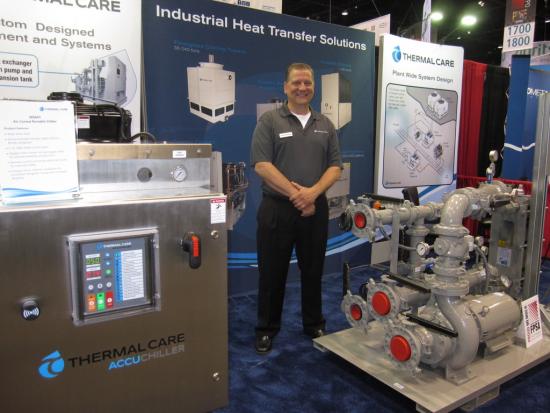
Steve Wojcieszek next to a Thermal Care AccuChiller.
Dimplex Thermal Solutions is a global cooling system company and owns the well-known Koolant Koolers product line of process chillers, made in Wisconsin. The Company has an impressive array of technologies and we will touch on just a few. In the booth, Bill Delmer and Jeff Wadington said their wash-down units are commonly used by food processors and packagers. The portable J Series cover a range from 1/8 to 2 tons and offer temperature stabililty at 3 °F for fluid setpoints in the 50-80 °F range. These air-cooled closed loop units use R-134a and features include stainless steel construction and effective drainage – all to prevent bacterial growth.
Dimplex Thermal Solutions also presented a line of low temperature specialty closed loop or flow-through chillers. Applications include pre-cooling milk to the pasteurization process. These chillers are built to withstand harsh environments at dairies (ambients from -20 °F to 95 °F) while still maintaining precise temperature control, with optional cooling capabilities all the way down to – 20 °F. Leaving fluid temperatures are 26 °F.
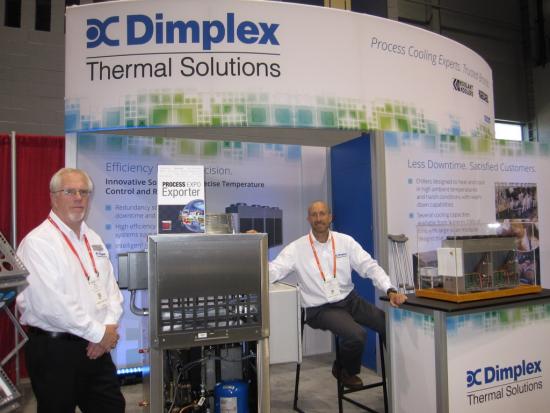
Bill Delmer and Jeff Wadington at the Dimplex Thermal Solutions booth (left to right).
New to me but not to the market, Delta T Systems is an interesting Wisconsin-based manufacturer of variable speed process chillers able to provide tight temperature control to within ± 5 °F (°C). Launched in 2017, their VS Series chiller line features variable speed hermetically sealed refrigeration compressors able to operate efficiently between 10% and 100% of rated capacity. Their marketing literature claims energy savings of up to 50% over traditional “fixed speed” chillers using hot gas bypass refrigeration regulation systems. The system features an electronic expansion valve and variable speed condenser fan regulated by refrigerant suction and condenser inlet temperature sensors. The standard operating range is from 0 °F to 80 °F (-18 °C to 27 °C) and pump capacity is from 2 to 72 gpm.
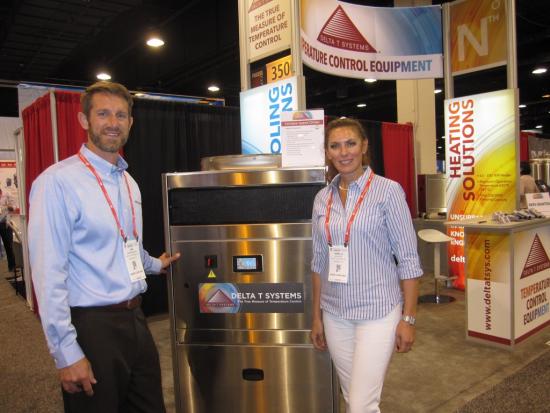
Dan Brandenburg and Isabella Naujokat at the Delta T Systems booth (left to right).
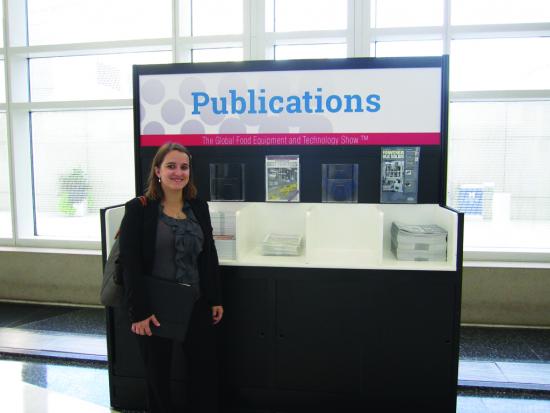
Clare Lamperski, from Compressed Air Best Practices® Magazine, making sure the literature bins are stocked at Process Expo!
Conclusion
I hope this show roundup has provided readers with a glimpse of what was happening at the 2017 show with regards to vacuum, chillers and compressed air systems. The 2019 Process Expo is scheduled for October 8-11, 2019 at the McCormick Place Convention Center in Chicago, IL. For additional information, visit www.myprocessexpo.com.
To read more about Food Industry Applications, please visit www.airbestpractices.com/industries/food.

